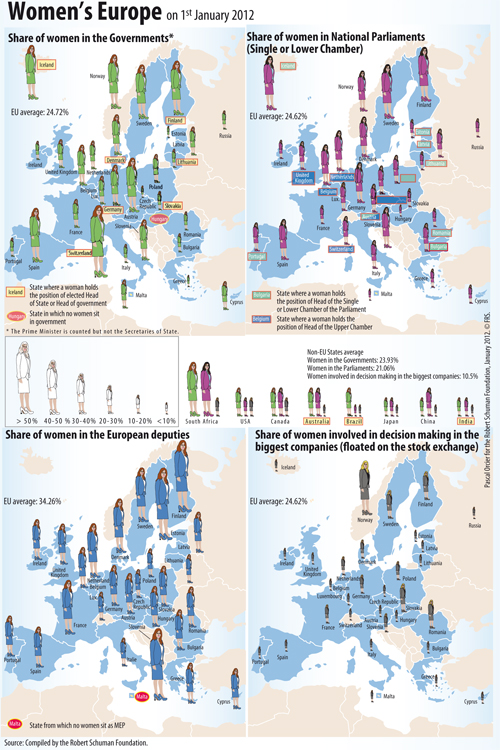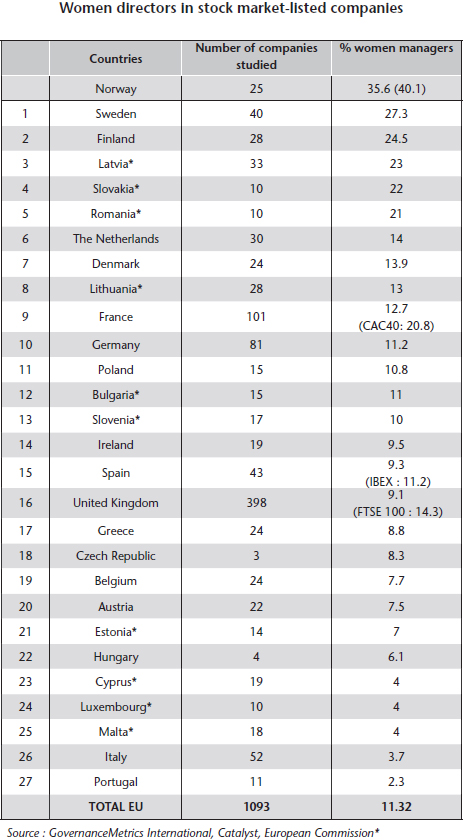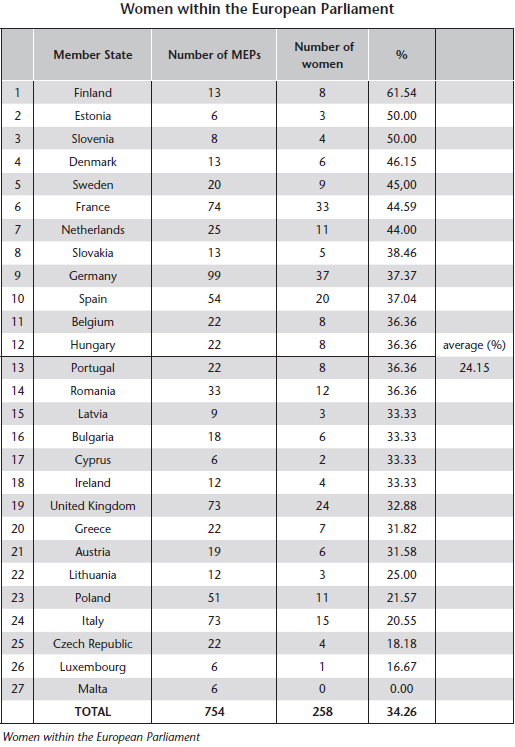
Available versions :
EN

Pascale Joannin
Introduction
Just as Europe is being criticised on all sides, we should recall some basic facts, and the first of these is the position of women in our society. Indeed if we look at this more closely, where is the quality of a woman's life best if not in Europe? Where are there more women in government and in parliament in the world, even if the situation still has to be impro- ved, if it is not in Europe? Finally where has the rise of women's position in business been strongest in 2011 if again it is not in Europe?
Of course it is not easy to be satisfied with the present situation which still leaves far too many women in a state of gross inequality. But a trend is emerging that will bring leaders, whoever they are, to promote greater inclusion of women in positions in the hierarchy that until now have been held almost exclusively by men. Soon it will no longer be acceptable to have a management board or a campaign or government team that comprises only men. Those who lag behind would do well to wake up otherwise they find themselves forced to take action or be badly considered.
It may be true that Europe is experiencing difficulties but many world players who think it still has some assets and advantages, watch it closely. Of course these would stand out more if Europe promoted in a self-regulating or regulated way - as planned by European Commission Vice-president Viviane Reding [2] by March 2012 - a European model of gender balance in which women occupy the real place they deserve, based on their abilities.
In this time of crisis the "women's" issue is now more relevant than ever before. It does not lie in "a return to the home", as some dare to imagine, but in greater invol- vement of women in the business world. Women are equally, and often more qualified than their male counterparts. Better qualified, women are also better equipped in times of crisis because they are often experienced managers and organisers. It would indeed be a pity not to involve them at this difficult point in time. But these vital developments are struggling to emerge naturally; stumbling blocks still exist and maintain a "glass ceiling" that is becoming increasingly difficult to bear. Change is occurring rather according to incentive and force. Many laws were adopted in 2011 in Europe to overcome reticence and to speed things up on companies' boards. The effects were felt immediately. France alone is catching up with the US. Moreover French women produce more children than other European women. Are there any other specific features about France as yet unnoticed?
Feminisation is still progressing too slowly in some countries but it is occurring. All of Europe is experiencing this phenomenon. According to management training specialists, future female managers are preparing for their new posts with surprising energy because they want their capabilities to be acknowledged. They will force men's involvement and oblige them to review the way they think and organise things. It was about time the situation changed. But can it last?

More and more women are involved in business
More and more women are going out to work; in the European Union, 62.5% of women work. However 31.4% of them work part time, this is four times the figure of part-time male workers. Moreover women with equal qualifications are far too often less well paid than men; the average wage gap in the Union is 17.5%, which is true discrimination.
Women are also more qualified than men; they hold 58.9% of the degrees delivered by European universities. Although they are highly qualified and arriving in ever greater numbers on the labour market, they are still in the minority in positions of responsibility in companies, notably at the highest levels. But things are changing.
The quota effect
Norway set the example in 2005 by establishing quotas for the presence of women on company boards. Hence it is the country where women are represented the best: 36%. But many other, notably European, countries (Spain, France, Belgium, Italy, the Nether- lands etc.) have followed suit by taking similar legislative measures to bring about radical change to old habits of strictly masculine co-optation. At the end of 2011 the first results of the implementation of these quotas show significant progress in the number of women who have one or several mandates as an administrator and everywhere there as been an increase in the number of companies who have included women on their boards. 68% of companies in Europe now have at least two women on their boards against 74% in the US [4].
Progress is particularly strong in France, for example, where after the law of January
2011, the number of women appointed to company boards, indexed on the stock exchange rose to total 20.8% amongst CAC 40 companies. Since the law is being applied progressively this trend should gather pace.
Towards true gender balance
However these encouraging results must not hide the reality of a situation that is far from ideal. This is for the simple reason that although legislative measures have led to significant progress with regard to gender balance on company boards, this is not true as far as executive committees are concerned. Women are not so well represented on the latter. In Europe for example only 20% of companies have an executive committee on which at least two women sit against 50% in the US.
Yet it is within executive committees that the most strategic decisions are taken. Therefore a great deal has to be done to move into these realms of power. The quota principle that is criticised for so many reasons, has a positive, highly influential effect, takes opinion forward, and disrupts the established order and the way people think and so it takes women's cause forward in business. It is certainly unfortunate to have had to use this legislative tool, but the masculine representatives of society would not have spontaneously taken the initiative to move things forward. The time of single sex company management seems now to be over.

Still too few women in politics
As a comparison the situation is stagnating, and is even worsening, as far as women in political life is concerned. The crisis is leading to the formation of governments comprising technocrats in which women are poorly served (Greece, Italy) and, it has to be admitted, rightwing governments do not do as well in terms of parity as their leftwing counterparts, even when they succeed them as in Spain. Often then, political will crumbles as cabinets are reshuffled, invariably revealing a trend whereby a man is appointed in place of a woman if she is leaving her seat. For example in France when Christine Lagarde was appointed as head of the IMF, her previous job was not taken over by another woman.
In parliaments which are supposed to represent all of the population women are still under-represented: according to the Interparliamentary Union (UIP) [4] on 30th November
2011, of the 44,984 members of parliament in the world (upper and lower chambers together), only 8,710 are women i.e. 19.8%.
The European Union (24.62%) is ahead of the Americas (22.6%), other European countries (20.5%), Sub-Saharan Africa (20.4%), Asia (18.3%), the Arab countries (13.5%) and the Pacific States (12.9%).
With regard to the number of women MPs the European countries occupy 7 of the top 10 places in world ranking. Of these 7 countries, four are EU Member States (Sweden, the Netherlands, Finland, Belgium).
With regard to the number of women who lead one of the chambers of Parliament, of the 41 women recorded by the UIP, 16 are European, 13 of whom come from EU Member States (Austria (both chambers), Belgium, Bulgaria, Estonia, Latvia, Lithuania, Netherlands, Poland, Portugal, Czech Republic, United Kingdom, Romania), 10 represent African states, 7 the Caribbean, 6 Asian states and 2 the Americas. Women represent only 15.6% of the leaders of parliament.
As of January 1st 2012, the average number of women in parliaments in the EU stands at 24.62%.
In the EU countries' governments women represent on average 24.15% of ministers, against 26.07% last year! One European government has no female ministers: Hungary.
On January 1st 2012, 9 women are the Prime Minister of their country, including four in Europe – 3 in the EU (Germany, Denmark, Slovakia) and Iceland – 1 in Australia, 1 in Bangladesh, 1 in Trinidad and Tobago, 1 in Peru and 1 in Thailand.
10 women are President of their country, including 4 in Europe – Finland [5], Lithuania, Swiss Confederation, Kosovo-, 1 in Argentina, 1 in Brazil, 1 India, 1 in Liberia, 1 in Costa Rica and 1 in Kyrgyz Republic.
There are more women in the European Parliament (34.26%) than in the National Parliaments (24.62%). With the Lisbon Treaty the number of MEPs rose from 736 to 753. But of the 17 new members there are only five women. 1 Member State (Malta) has not sent any women.

Women should harbour no illusions. They will achieve nothing if they do not fight a daily battle against red-tape, habits, stereotypes and other clichés that are still rife at the beginning of this, the 21st century. It is not a question of bringing women into conflict with men; they are complementary – on the contrary it is a question of ensuring that there is a better balance between the two sexes. Given the challenges that await us it will certainly take two to face and overcome them.
There are many hurdles, mentalities change slowly. But if nothing changes then incen- tives, and even binding measures will win through. Several instruments now exist and some have already been implemented. Others are set to be developed in the near future. In Europe for example, the Citizens' Initiative established by the Lisbon Treaty gives European citizens an opportunity to have their say as of 1st April 2012. Women could use this to ask for the real application of the equality principle which is included in the treaties. The Robert Schuman Foundation has already met many European women who would like to be involved in a Citizens' Initiative to take European legislation forward [6]. European women cannot be satisfied with the present situation.
[1] This text is published in the Schuman report on Europe, State of the Union in 2012, Springer-Verlag (to be released).
[2] http://ec.europa.eu/commission_2010-2014/reding/multimedia/news/2011/03/20110301_fr.htm
[3] http://www.ipu.org/wmn-f/world.htm
[4] http://www.femmes-europe.eu/
[5] The outgoing president, Tarja Halonen, has been replaced on 1st March 2012 by Sauli Niinistö, elected on 5th February.
[6] http://www.femmes-europe.eu/
Publishing Director : Pascale Joannin
To go further
Agriculture
Bernard Bourget
—
17 February 2026
European Identities
Patrice Cardot
—
10 February 2026
The EU and Globalisation
Olena Oliinyk
—
3 February 2026
Strategy, Security and Defence
Jean Mafart
—
27 January 2026

The Letter
Schuman
European news of the week
Unique in its genre, with its 200,000 subscribers and its editions in 6 languages (French, English, German, Spanish, Polish and Ukrainian), it has brought to you, for 15 years, a summary of European news, more needed now than ever
Versions :






